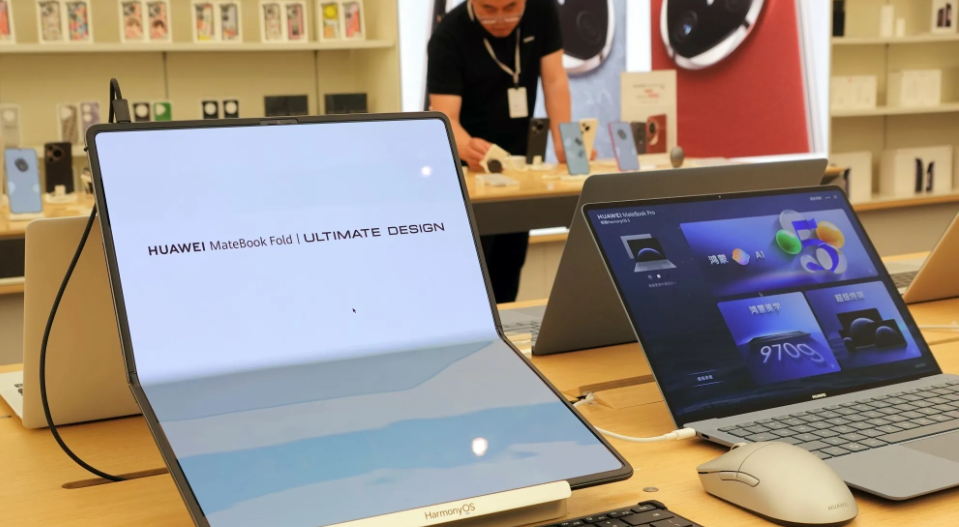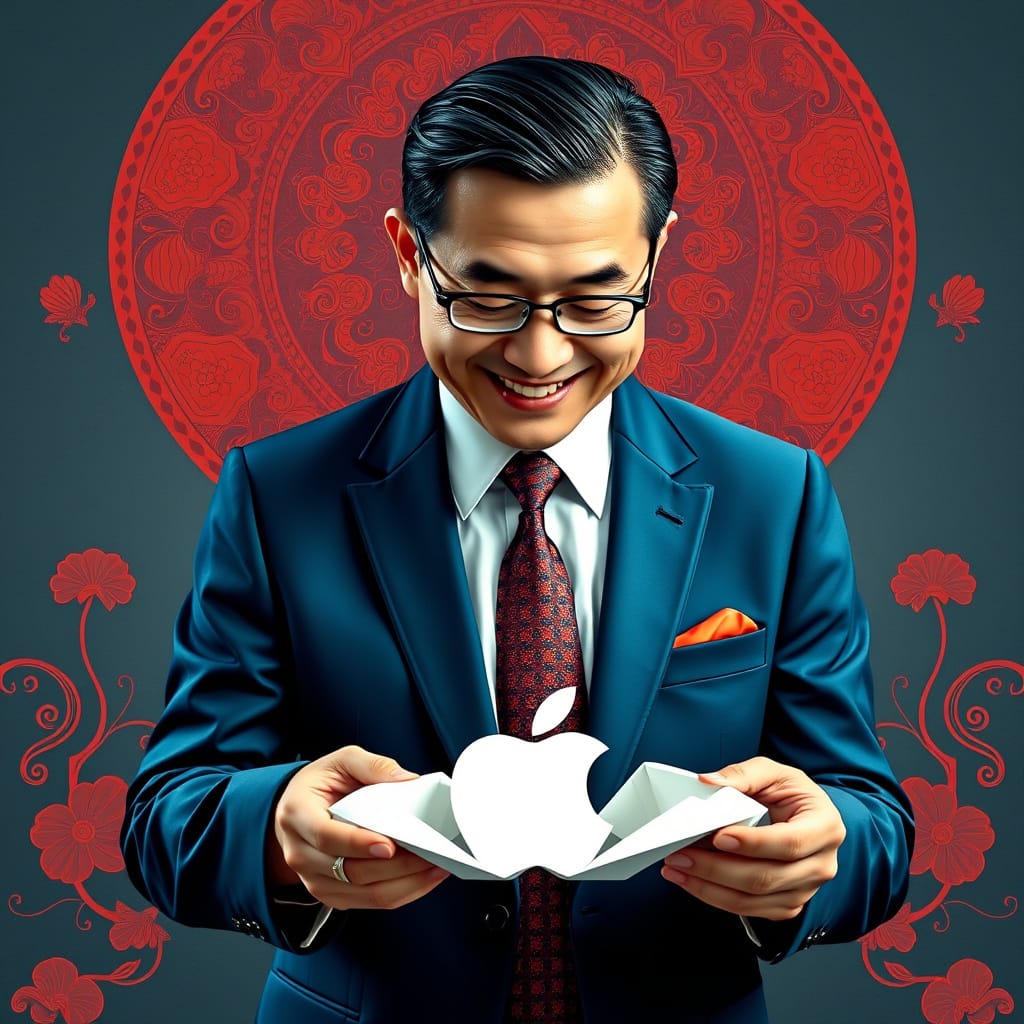In the gleaming Apple Cupertino campus, where sunlight bounces off polished glass and aluminum with algorithmic precision, Apple executives gather daily in their sacred ritual. They sit in perfectly spaced ergonomic chairs, sipping artisanal coffee from bio-degradable cups, and engage in what they reverently call “innovation.” Today’s agenda, much like yesterday’s and tomorrow’s: discussing how to convince consumers that changing the processor name from M3 to M4 represents a revolutionary leap in computing technology.

Meanwhile, 6,200 miles away in Shenzhen, China, where the air vibrates with the hum of ACTUAL innovation, Huawei engineers are casually folding the future. Not metaphorically—literally folding screens, folding expectations, and folding the narrative that Chinese tech merely copies Western design. The Huawei MateBook Fold represents not just a product but a philosophical rebuttal to Silicon Valley’s self-satisfied incrementalism.
The Comfortable Illusion of Leadership
Apple’s strategy has evolved from Steve Jobs‘ “Think Different” to Cook’s “Think Imperceptibly Different But Charge Significantly More.” The company that once put 1,000 songs in your pocket now specializes in putting 1,000 excuses in their press releases for why groundbreaking features aren’t quite ready. Apple Intelligence, announced with the typical messianic fervor we’ve come to expect from Apple events, remains perpetually “coming soon”—a technological Godot that users await while their Apple devices perform increasingly sophisticated versions of tasks they could already do in 2019.
Dr. Eleanor Shepherd, tech anthropologist at MIT, explains: “Apple has mastered the art of innovation theater. They’ve discovered that the anticipation of revolution is more profitable than revolution itself. Why deliver Apple Intelligence today when you can spend three years selling devices based on the promise of its arrival?”
The M-series chips, undeniably impressive engineering achievements, have become Apple’s favorite mis-direction. “Look at our custom silicon!” they proclaim, while users simply want screens that fold without cracking or batteries that last through dinner. It’s akin to a chef bragging about their imported Japanese knife while serving you microwave mac and cheese.
The Paradox of Prohibition
In what historians will someday call “The Tech Effect,” Western attempts to hamstring Chinese tech innovation through bans, restrictions, and pearl-clutching security concerns have produced precisely the opposite effect. Huawei, cut off from American semiconductors and Google’s Android ecosystem, didn’t wither as expected. Instead, like an immune system responding to a pathogen, it grew stronger, more self-sufficient, and increasingly innovative.
The Huawei Mate Book Fold stands as evidence of what happens when you tell a tech giant “you can’t have our toys” and force them to build their own playground. The device’s seamless transition between modes—laptop, tablet, presentation display, and even tent configuration—makes Apple’s “revolutionary” touch bar seem like a Stone Age tool by comparison.
“We’ve witnessed an unprecedented example of the Tech effect in tech development,” notes Vincent Zhao, global technology strategist at Bernstein Research. “By attempting to suppress Huawei’s growth, Western policies created the very conditions that accelerated their independence and innovation. It’s like trying to stop a forest fire by throwing dried leaves at it.”
The Cobra Effect: Tech Edition
The term “Cobra Effect” originated from colonial India, where the British government, concerned about cobra snake populations, offered bounties for dead cobras. Enterprising Indian locals not to miss a money making opportunity and to stick it to their colonial masters, began breeding cobras for the reward, ultimately increasing the snake population. When the British canceled the program, breeders released their now-worthless snakes back into the wild, making the problem exponentially worse.
Today’s tech Cobra Effect manifests in how Western rhetoric about Chinese technology has undermined its own intended outcomes. Constant allegations of “security concerns” without substantial public evidence have created a skeptical consumer base that increasingly views such claims as protectionist propaganda rather than legitimate warnings.
“Every time a U.S. official warns about Huawei without specific evidence, they inadvertently create another thousand Huawei customers outside America,” explains Dr. Mei Zhang, digital geopolitics expert at Singapore National University. “Global consumers increasingly interpret American tech anxiety as fear of superior competition.”
The irony reaches its peak when considering the Mate Book Fold itself—a device demonstrating that Huawei didn’t just survive America’s technological embargo but thrived because of it. Forced to develop its own solutions, Huawei created a folding laptop-tablet hybrid that makes Apple’s hypothetical “IFold” (still trapped in the rumor mill alongside Apple Intelligence) seem like conceptual vaporware.
Living in the Future While Waiting for Apple to Arrive
Walk through Shanghai, Shenzhen, or Beijing today, and you’ll experience what can only be described as technological asynchronicity—the disorienting sensation of living simultaneously in the present and what Silicon Valley insists is the future.
Chinese consumers already take for granted experiences that Apple users are told to anticipate breathlessly: seamless folding devices, integrated AI that doesn’t require cloud processing, and mobile payment ecosystems so advanced that Western “tap to pay” solutions seem like quaint technological cosplay.
Wang Li, a 24-year-old software developer in Guangzhou, expresses confusion about Western tech coverage: “American tech reviewers talk about folding phones and laptops like they’re science fiction. We’re on second and third-generation devices already. It’s like watching someone get excited about discovering fire.”
The Mate Book Fold embodies this parallel technological timeline. While Apple stages elaborate product reveals to announce marginally improved screens or slightly faster processors, Huawei has reimagined the fundamental form factor of computing devices. Their approach asks not “How can we make laptops incrementally better?” but rather “Why are laptops still shaped like laptops at all?”
The Macbook Decision Paralysis
Apple’s current laptop strategy resembles nothing so much as a particularly cunning psychological experiment. Present consumers with just enough meaningless choices to create decision paralysis, then profit from their confusion.
MacBook Air or MacBook Pro? 13-inch or 15-inch? M2 or M3? The differences, increasingly microscopic to the average user, create the illusion of important decision-making while masking the absence of genuine innovation. It’s technological homeopathy—diluting actual advancement to such infinitesimal levels that users must convince themselves they can detect its presence.
“Apple has perfected the art of selling the same product at different price points,” observes consumer psychologist Dr. Rebecca Townsend. “The primary difference between MacBook models is how effectively they separate customers from their money.”
Meanwhile, Huawei’s approach with the Mate Book Fold is embarrassingly straightforward: build a device that transforms to meet user needs rather than forcing users to choose between marginally different static configurations.
The IFold Cometh (Eventually, Theoretically, Perhaps)
Apple’s approach to folding technology resembles a British aristocrat watching the peasants enjoy a new form of dance—initially dismissive, then claiming they’ve been perfecting it privately all along, finally arriving late to proclaim they’ve reinvented the very concept of movement.
The hypothetical “IFold”—Apple’s perpetually imminent entry into folding devices—has achieved almost mythical status among tech enthusiasts. Like fusion power or comprehensive Twitter (Now X) content moderation, it remains 5-10 years away, no matter when you ask.
Mobile phone industry analyst Trevor Monroe explains: “Apple has elevated ‘fashionably late’ from social strategy to business model. They’re not missing the folding device revolution; they’re just waiting for everyone else to make all the mistakes before swooping in to claim they’ve perfected it.”
Leaked internal documents suggest Apple executives refer to this as the “Columbus Strategy”—arriving after others have done the difficult work of discovery, then planting your flag and claiming to have led the expedition.
The Propaganda Boomerang
Perhaps most fascinating is how Western tech media’s portrayal of Chinese technology has created a self-defeating narrative cycle. Headlines warning of Chinese technological threats implicitly acknowledge Chinese technological advancement. The more urgent the security concern, the more impressive the technology must be.
The silent admission in every “Huawei security risk” story is that their technology has become too good to ignore. No one writes fearful articles about irrelevant or inferior products.
“It’s the technological equivalent of claiming someone cheated in an exam after they scored higher than you,” notes media analyst Sophia Chen. “Even if the accusation were true, you’ve still acknowledged they outperformed you.”
This propaganda boomerang has transformed Western tech restrictions from barriers into badges of honor for Chinese manufacturers. Being banned by the U.S. government has become shorthand for “advanced enough to be considered threatening,” a marketing distinction no advertisement budget could buy.
The Conclusion We’re Not Supposed to Draw
The Huawei MateBook Fold represents more than just an innovative device—it symbolizes a shifting technological world order that many in Silicon Valley and Washington would prefer to deny. While Apple devotees wait patiently for “one more thing” that increasingly feels like “the same thing slightly differently packaged,” Huawei has embraced the chaotic freedom that comes from being expelled from the Western tech ecosystem.
The comfortable narrative—that true innovation happens primarily in California—faces its most serious challenge not from copycat products but from genuinely novel approaches to computing that make the smartphone revolution look like a modest iteration.
As Western consumers debate whether to upgrade to a marginally faster version of a device they already own, Chinese users are experiencing computing that adapts to humans rather than forcing humans to adapt to it. The Mate Book Fold doesn’t just bridge the gap between tablet and laptop; it questions why we accepted that gap in the first place.
What remains unclear is not whether Apple will eventually release its own folding device—they certainly will, accompanied by the usual claims of reinvention—but whether Western consumers will continue accepting technological delay disguised as perfectionism.
In Orwell’s “1984,” the Party slogan proclaimed: “Who controls the past controls the future.” In today’s tech landscape, it appears who controls the narrative controls the perception of innovation. But as the Mate Book Fold demonstrates, actual innovation eventually breaks through even the most carefully constructed reality distortion field.
So what do you think? Are we being sold incremental updates as revolutionary while actual revolutions happen elsewhere? Has Apple become the very establishment it once claimed to rebel against? Share your thoughts below—unless, of course, you’re waiting for Apple to invent commenting technology that already exists.
Enjoyed this dose of uncomfortable truth? This article is just one layer of the onion.
My new book, “The Subtle Art of Not Giving a Prompt,” is the definitive survival manual for the AI age. It’s a guide to thriving in a world of intelligent machines by first admitting everything you fear is wrong (and probably your fault).
If you want to stop panicking about AI and start using it as a tool for your own liberation, this is the book you need. Or you can listen to the audiobook for free on YouTube.
>> Get your copy now (eBook & Paperback available) <<




GIPHY App Key not set. Please check settings